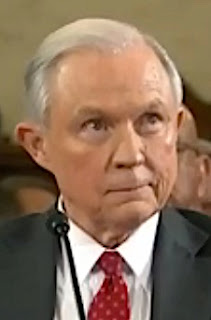Going after Jeff Sessions
THE SENATE Judiciary Committee is vetting Alabama Sen. Jefferson Beauregard Sessions III for the office of Attorney General of the United States today in Washington, in the Russell Senate Office Building room 325. That rather prosaic address may be the ground zero for the next iteration of the United States as a democracy, the place where civil rights as an American foundational is, or is not, more than a quaint phrase from the national past.
While many of the country’s activists and political observers have been boarding up the windows and double-locking the storm doors (in anticipation of the serious nor’easter expected midday on January 20th), members of other organizations, and a private citizen or two, have been starting to take the fight directly to Sessions, possibly a whole 'nutha hurricane brewing. They strongly oppose Sessions' confirmation as the heir to Eric Holder.
On Monday, in a letter released direct to the Judiciary panel, Khizr Khan — the courageous Gold Star father who spoke truth to power at the Democratic National Convention — called on the committee “to think beyond partisan politics” as it weighs Sessions’ fate.
“Thirty years ago, a bipartisan group of senators rejected Mr. Sessions' nomination to be a federal judge. His record since then does not give us any reason to believe that those senators were in error... The most minimal standard for leading the Department of Justice must be a demonstrated commitment to pursuing justice for all Americans. Mr. Sessions fails to meet that standard.”
◊ ◊ ◊
Also on Monday, New Jersey Democratic Sen. Cory Booker made clear his intention to testify against Sessions, on the basis of the AG nominee’s controversial racially-intolerant past. “I’m breaking with a pretty long Senate tradition by being a sitting senator testifying tomorrow against another sitting senator,” Booker told MSNBC’s Chris Hayes. “These are extraordinary times and they call for extraordinary measures.”
“We’ve seen consistently Jeff Sessions voting against the Matthew Shepard Act, speaking out against the ideals around the Voting Rights Act, taking measures to block criminal justice reform. He has a posture and a positioning that I think represent a real danger to our country.”
And last week, the NAACP, the nation’s oldest American civil-rights advocacy organization continued its evolution in this century, reaching back into the past, embracing use of a proven venerable weapon to use against a new foe.
◊ ◊ ◊
ON JAN. 3, Cornell William Brooks, the NAACP’s national president, led an old-school, old-style sit-in at one of Sessions’ Alabama offices in protest of his appointment as Attorney General by president-presumptive Donald Trump.
Brooks sat with three associates (maybe other NAACP members) and tweeted a photo from the Sessions office. Brooks made a pledge to stay there until Sessions withdrew his name from consideration or until Brooks and the others were “arrested” or removed by authorities. Not long after the tweeted photo, authorities came to do just that.
Other protesters blanketed the state of Alabama, conducting wildcat protest at Sessions district offices in Dothan, Montgomery, Birmingham and Huntsville, as well as at Sessions’ main office in Mobile.
"The Voting Rights Act was born in Selma. Sen. Sessions was born in Selma. If he wants to honor the legacy of Selma, honor the sacrifices of the Selma marches, honor what so many have given here in Alabama and across the country for the right to vote, he should withdraw his own name," Brooks said late on Jan. 3.
◊ ◊ ◊
THIS DIDN’T come outta nowhere. Sessions, a product of the state that was both the cradle of the Confederacy and of Jim Crow, has had a long and contentious past with African Americans. He's been accused of calling the NAACP and the American Civil Liberties Union “un-American” in a private conversation.
The same Judiciary panel Sessions is in front of now previously rejected him for a federal judgeship in 1986, when certain outwardly bigoted comments disqualified him. Thomas Figures, a former assistant U.S. Attorney in Alabama, said Sessions frequently called him “boy” and that he once told him to “be careful what you say to white folks.”
More recently, he’s weighed in against widening protections for LGBT Americans, and voted against the Matthew Shepard and James Byrd, Jr. Hate Crimes Prevention Act, made law in October 2009, and intended to expand federal hate-crime law to cover crimes sparked by a person’s sexual orientation or gender identity. He fought like hell against removal of the Confederate flag, saying it was "a huge part of who we are."
And Sessions has been a fierce opponent of any immigration bills that gave any path to citizenship for immigrants in the United States.
◊ ◊ ◊
Sessions isn’t a fire-breathing dragon; there've been times during his long Senate career when he reached across the aisle, working with Dems on certain issues, including some elements of criminal justice reform. As much as anything, this will likely be his saving grace in the confirmation hearings: the fact that he’s worked with the loyal opposition just enough to keep from being painted as a solely ideological animal.
In any case, the man whom Heidi Beirich of the Southern Poverty Law Center said would be “a tragedy for American politics” in the Trump White House is likely a slam-dunk to be Attorney General. The Democrats don’t have the numbers, and Senate Republicans will almost certainly vote as a bloc to confirm.
That’s when we’ll know, or certainly when we’ll start to learn, how far the new Jeff Sessions is from the old Jeff Sessions. A lot of people aren’t convinced there’s enough distance between the two.
Lizetta McConnell, who directs the NAACP's Mobile branch, called him out in a press release last week: "We need someone who realizes that an attorney general has to actually care about the people's rights he's protecting, and not just doing it because it's his job."
Image credits: Sessions and Booker: MSNBC. Sessions office photo: Cornell Brooks, NAACP.





.jpg)
Comments
Post a Comment